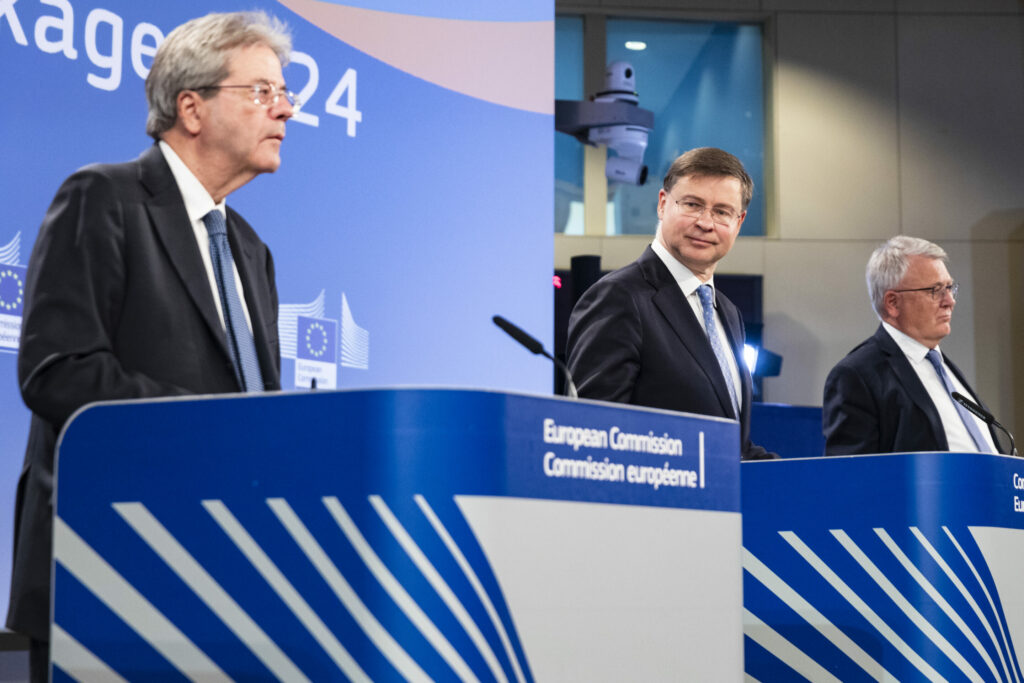The European Commission has proposed that an Excessive Deficit Procedure (EDP) should be put in place for Belgium and six other Member States that are also not meeting minimum EU budgetary rules.
If the proposal is approved by EU Finance Ministers next month, the European Commission will outline specific recommendations later this year on how Belgium should correct its budget deficit.
Belgium’s budget deficit is on target to become one of the largest in Europe in the coming years, having reached 4.4% of GDP (gross domestic product) in 2023 and projected to grow to 4.7% of GDP in 2025.
Meanwhile, the country's overall national debt sat at 105.2% of GDP in 2023, and is forecast to grow to 119% of GDP in the decade to 2034.
The Maastricht Treaty sets out the rules for countries in the eurozone, and includes a requirement that governments limit their deficits to 3% of GDP and public debt levels to 60% of GDP.
For almost four years, rules were suspended to accommodate emergency spending during the pandemic and other economic shocks, but are fully applicable again in 2024.
In addition, new rules which came into force in April require Member States running deficits greater than 3% of GDP to reduce their overspend by at least 0.5% per year until they fall below the 3% threshold.
The new rules also require all Member States to prepare medium-term expenditure plans, and submit them to the European Commission in September of this year.
Commission proposes excessive deficit procedure for Belgium
The package published on Wednesday included a report which outlines the excessive deficit procedure (EDP) under Article 126(3) of the Treaty of the Functioning of the EU.
It concluded that seven member states (Belgium, France, Italy, Hungary, Malta, Poland and Slovakia) are in breach of EU fiscal rules, meaning that a special procedure should be opened for each country.
Among the seven countries concerned, Belgium's budget deficit of 4.4% of GDP was the smallest, while larger deficits in France and Italy sit at 5.5% and 7.4% respectively.
Still, the European Commission noted that there are "high risks" to Belgium's debt sustainability over the medium and long term. It says that the effectiveness of Belgium's national budgetary framework "remains weak and the coordination across government levels is limited", with few rules governing federal and regional spending.
If EU finance ministers confirm the European Commission's proposal at the next Economic and Financial Committee on 16 July, the Commission can then make specific recommendations to Belgium on how to correct its deficit.
The Commission will enter into closed door discussions with Member States in the coming months around the detail of these recommendations and how they might fit with national budgetary plans. The official recommendations will not be published publicly until autumn.
The Commission said this aims to ensure as close an alignment as possible with the medium-term expenditure plans that Member States must submit in September, although it emphasised that there are still some clear benchmarks, such as the minimum reduction of deficits by 0.5% of GDP per year on average.
Concerns around austerity measures
Esther Lynch, General Secretary of the European Trade Union Confederation, said that forcing Member States to make "draconian cuts to public expenditure" is a "recipe for economic, social and political disaster".
"The obsession with deficit reduction completely misses addressing the challenges Europe is facing with the twin transitions. What Europe needs is social and green investments," she said, adding that the Commission discussing its proposed recommendations with Member States in private illustrates a "lack of transparency" around the EU's approach to fiscal policy.
"The European Commission is acting against the priorities of European citizens, which are the fight against poverty, health, protection of jobs and fight against climate change," Lynch continued. "While the US, which has much higher debt and deficit, is investing to support good quality jobs and decarbonise its economy, Europe is reverting back to failed recipes of fiscal tightening."
Paolo Gentiloni, EU Commissioner for Economy, said that while EU fiscal rules are entering a new cycle after being suspended for almost four years, it "does not mean back to normal, because we are not living in normal times, and definitely not back to austerity, because this would be a terrible mistake."
He added that Wednesday's announcement focused on three strands: strengthening competitiveness, stepping up the implementation of national recovery and resilience plans, and taking the first steps in applying new economic rules.
He said that the policy guidance "reflects both the need for fiscal prudence and the immense investment needs we face", adding that he is "confident that it will help us deliver on our common objectives".

